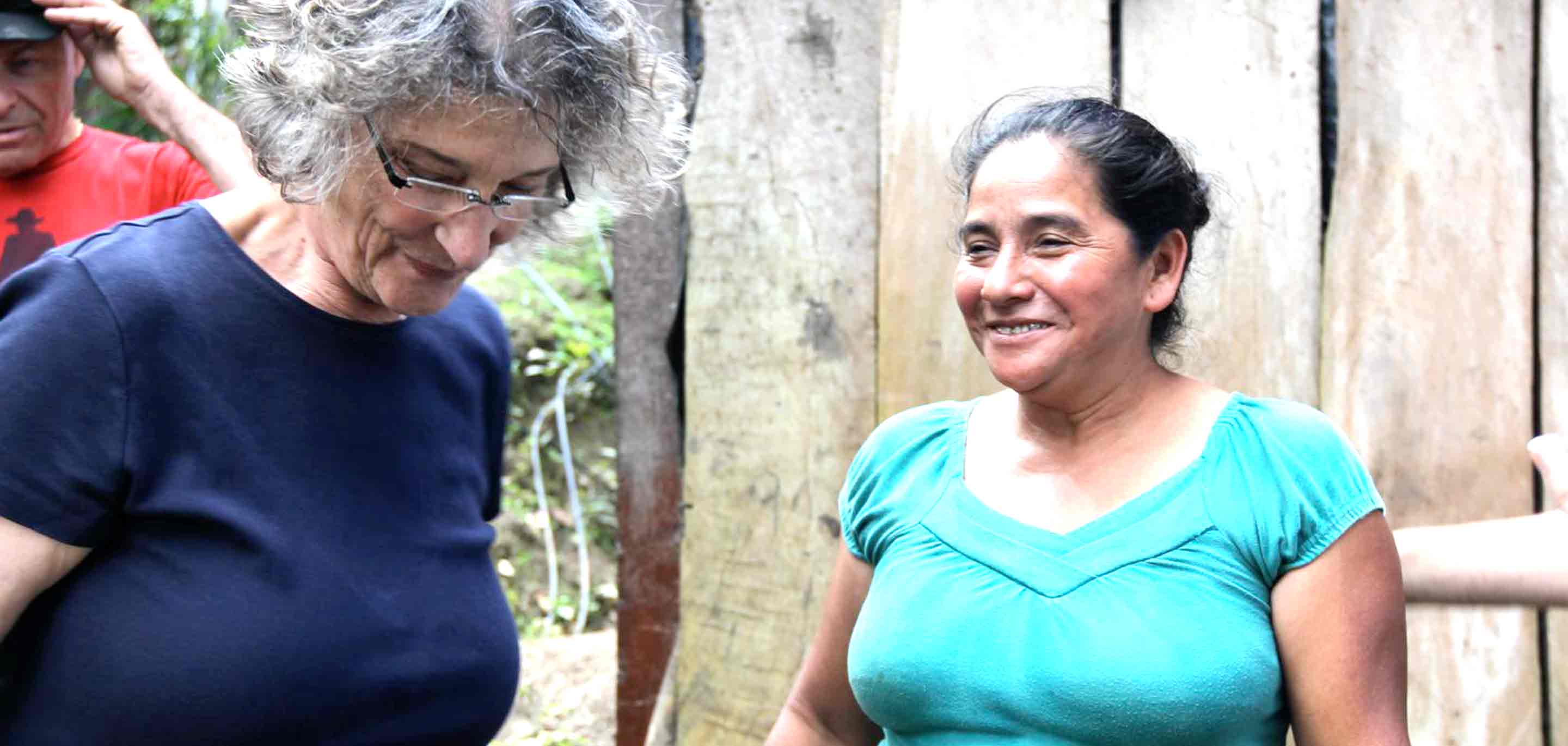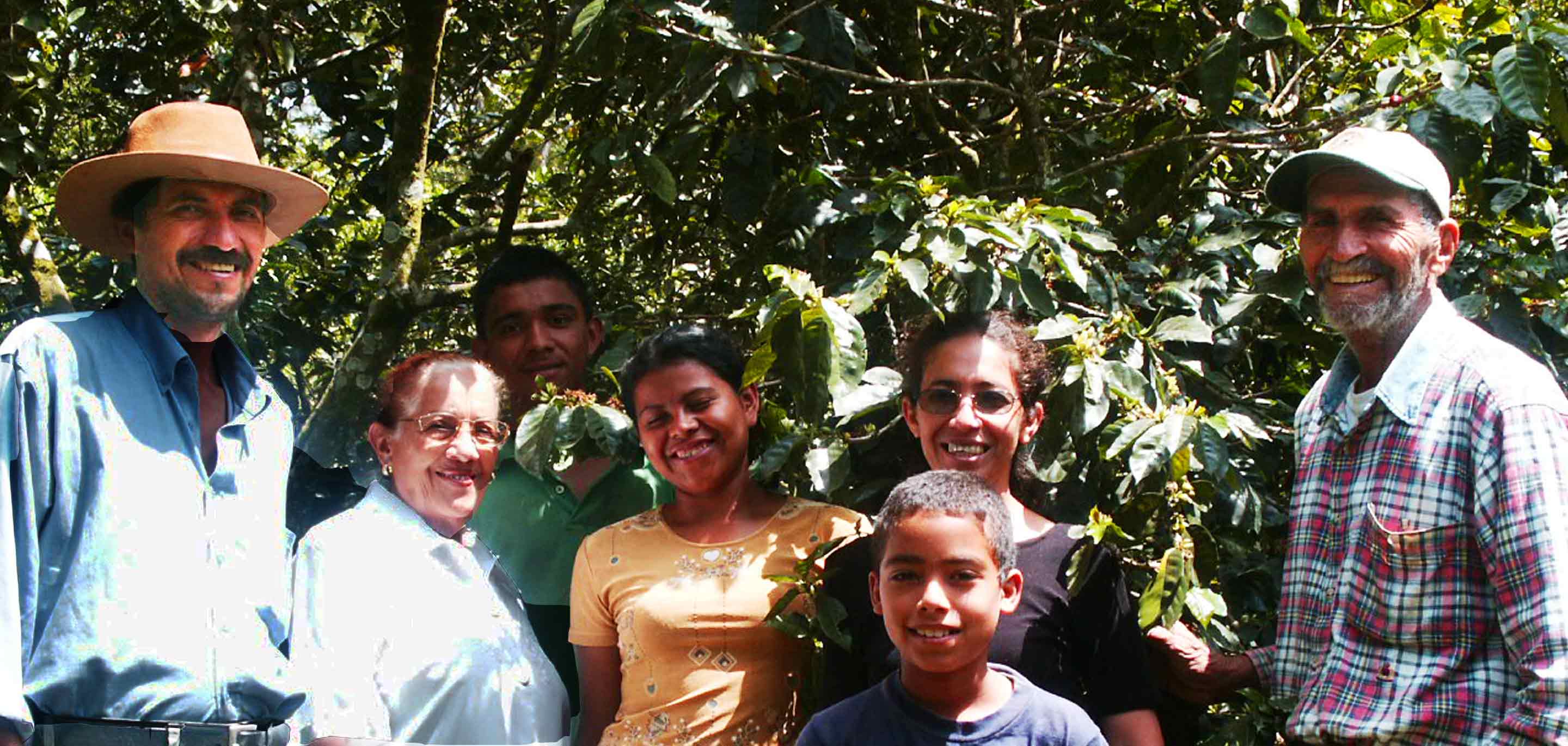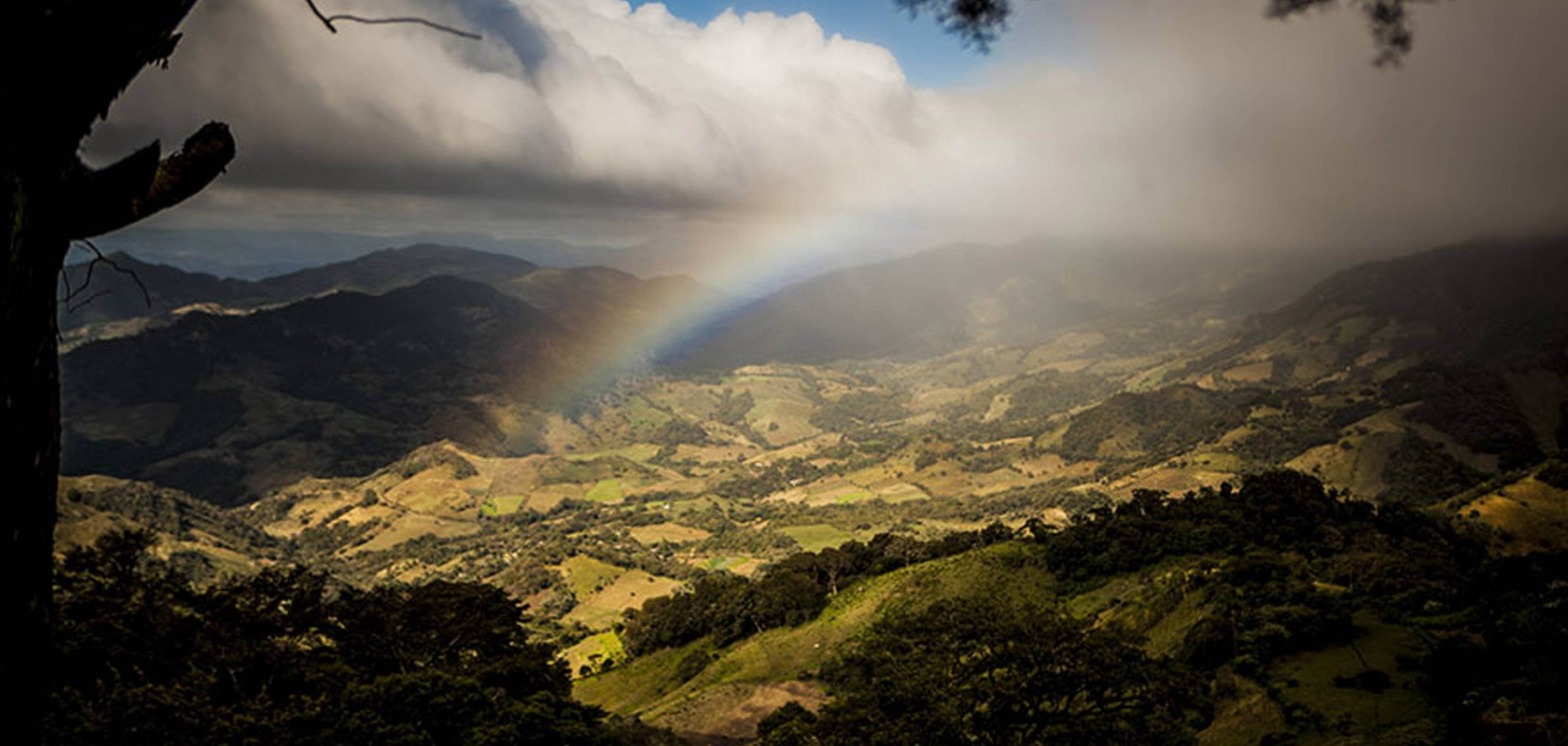
Our Blog
Women in Coffee: Part I
View BY :
Women in Coffee: Part I
By Joan Katzeff, Co-Founder & Director of Operations at Thanksgiving Coffee Company
I first visited Nicaragua in the early 1990’s. The terrible years of the Iran Contra Civil War were still dominant in the memory of the people, and its effects had taken a huge toll on coffee farmers already enduring a difficult way of life.
At one of the beneficios (where coffee is processed), I watched an assembly line of women sitting on a motley collection of chairs on either side of a moving conveyor belt. Their job was to separate defective beans from those that made the grade for sale and export. It was noisy, hot and dusty, so the women also wore masks that covered their noses and mouths while working.
I left knowing that as soon as I returned home, I would figure out a way to raise money to purchase new ergonomic chairs for those women, and I did, in a gesture of solidarity. But, I knew it was just a drop in the bucket.
On another small group trip in 2012, we visited the beneficio of Soppexcca, a cooperative composed predominantly of women.
We spent some time “helping” the women transfer coffee beans from the drying patio into sacks that were in process for export. I’m not sure how helpful we were, but it was an enjoyable cultural exchange. These women performed hard physical work on a daily basis. Many of them walked miles to and from work each day if transportation wasn’t available, preparing meals for their families before and after work at the beneficio, as well as doing the rest of the work required in the home, and child rearing responsibilities, as well.
We were invited to sit in on a Board of Directors meeting composed of some of the women we’d worked with, and others from the cooperative who had founded and were operating a small store at the beneficio that sold food and sundries, and was a source of additional income for them.
While there has been progress made in the recognition and fair and equal compensation for women who work in coffee, there is still a long way to go.
Women we’ve met on buying trips to Central America and Africa live in remote towns and villages without running, potable water or electricity. Homes are rustic, often with a dozen or more family members living in one or two rooms with dirt floors. Many women don’t have access to health care, marry young, and have children soon after. During the “thin months” when coffee income is low, they and their children often go hungry. They perform much of the physical labor required to grow and harvest coffee, but have almost no influence on decisions about how family income is spent. They are typically uneducated, impoverished and disconnected from resources.
Image caption goes here
Thanksgiving Coffee began to address these issues in two ways
First, by purchasing only from cooperatives that show a willingness to eradicate this kind of gender inequity. They do this through their actions in support of remedies to eliminate food insecurity, and promoting, providing and ensuring access to training and education for women. These actions will enable women to participate as equal partners in the industry.
The second way we, as a company, have supported women in coffee is through “The Recognition of the Unpaid Work of Women.” We began this work in 2014, in Nicaragua by adding $0.10 per pound to all coffees we purchase from the Prodecoop and Soppexcca Cooperatives. They have committed to using these funds to improve the lives of women in coffee. The next post will go into detail about what has been accomplished to date.
– Joan Katzef
Joan Katzeff, Co-founder of Thanksgiving Coffee Company and Fatima Ismael, the director of Soppexcca.
these coffees pay into Our Fund that Recognizes the Unpaid Work of Women.
Recommended Reading
Back to the Blog-
![Roots & Regeneration: Pioneering Regenerative Agriculture]()
Pioneering Regenerative Agriculture
High in Nicaragua's pristine Arenal Forest Reserve, at 1,500 meters above sea level, Finca los Pinos stands as a testament to agricultural transformation. Here, Byron Corrales and his family have spent over four decades pioneering a different way of farming coffee. Since embracing organic practices in 1986, they've developed an innovative approach that works in perfect harmony with nature. Through their dedication to biodynamic farming, they've not only twice earned top honors for their extraordinary coffee, but they've also created a model for sustainable agriculture that's changing how we think about coffee cultivation.
Sarah Corrales on her families coffee farm
Byron Corrales hugging a tree on his family coffee farm
A Legacy of Excellence
Our relationship with the Corrales family spans three generations, witnessing their evolution from traditional farming to becoming leaders in biodynamic agriculture. Byron's innovative spirit led him to develop the exceptional Maracaturra variety, a unique hybrid that produces remarkably large beans – distinctively bigger than typical Arabica coffee beans. This size isn't just for show; it allows for exceptional taste elements that smaller beans simply cannot achieve, delivering a remarkable sweetness and richness in every cup.
Benita Corrales, Byron's mother
The first meeting with Thanksgiving Coffee Company in 1992- Left Byron Corrales, Right Arnulfo Corrales
Arnulfo Corrales, Byron's father
Left to right - Thanksgiving Coffee's Co-Founder Paul Katzeff, Byron Corrales, and Nick Hodgkins (Etico -The ethical trading company)
the Art Of Processing
Byron with drying natural Maracaturra coffee beans.
Corrales' artisanal approach to processing begins long before the cherries reach the beneficio (drying patio). On his farm, every element serves an integral function in creating exceptional coffee. This includes the carefully selected forage crops sustaining his cattle, whose manure enriches the compost used around the coffee trees, as well as the diverse pollinators - from honeybees to other beneficial insects - that support optimal cherry development.
For Corrales, successful coffee processing stems from creating a balanced, thriving ecosystem that produces the highest quality cherries possible for processing. This foundation of environmental harmony directly influences the clarity and complexity of his final cup.
The Natural process is when the coffee cherries are dried whole, without removing the pulp or using water or machines, and has become Byron’s preferred method for many reasons, as he explained in this video. It is a very good choice to reduce the use of fossil fuels and for water conservation, as well as the added antioxidant health benefits.
The Living Systems Of Los Pinos
At Finca los Pinos, every element serves multiple purposes in an intricate dance of mutual support:
- Native and planted trees provide essential shade and soil health
- Free-ranging cattle contribute to natural fertilization cycles
- Coffee cherry pulp (cascara) is recycled into nutritious cattle feed
- Birds and beneficial insects maintain natural pest control
- Pine trees create unique conditions that enhance both soil and coffee quality
Los Pinos coffee farm looking out over the forest
Soil: The Foundation of Life
Byron Corrales with his hands full of soil
Byron's approach to soil health demonstrates the core principles of regenerative agriculture. "The farmers that produce with agrochemicals and herbicides destroy the life of the soil," he observes. "We protect it." This protection includes:
- Maintaining ground cover to retain moisture
- Supporting microorganism and mycorrhizal networks
- Using natural fertilization methods
- Working with, rather than against, natural processes
“I feel really happy that those who drink my coffee are drinking a cup of life”
Byron Corrales
Climate Resilience Through Diversity
Great video produced by Viva La Finca - Virtual origin experience - Byron Corrales of Finca Los Pinos
Understanding the challenges of climate change, Byron has implemented robust adaptation strategies:
- Diverse tree species for enhanced shade coverage
- Strengthened soil biology
- Natural mineral enrichment
- Water conservation systems
The Unique Maracaturra Experience
This regenerative approach culminates in the cultivation of Maracaturra, a special variety found only at Finca los Pinos. This unique hybrid of Maragoype and Caturra (Bourbon) produces a truly exceptional coffee with:
- Juicy apricot aromatics
- Rich cashew nuttiness
- A deeply toned sweet cacao finish
- Remarkable sweetness unique to the large bean size
- Complex flavor elements impossible to achieve with conventional varieties
A Vision for the Future
"I want to transmit our family's art, our work of many years, discovering the flavors we've learned to bring forth from our mountains, expressed in this cup by way of respect for our environment," Byron shares. This respect for environment and commitment to regenerative practices creates coffee that is, in Byron's words, "the expression of life and the life energy of all the living beings who live in our community."
The Corrales Family from one of our origin trips.
Sold outEach cup of Byron's coffee embodies a powerful truth: regenerative agriculture can produce extraordinary coffee while healing the earth.
Our Byron's Blend is where ancient farming wisdom meets modern artistry. By masterfully combining washed and natural processed Maracaturra coffees, we create a harmonious cup that showcases the finest expressions of both methods. The result is more than a blend – it's a testament to coffee craftsmanship at its peak.
As Byron himself reminds us with characteristic wisdom: we are "celebrating with joy the responsibility of protecting the future of our generations." In every sip, you taste that promise.
Lavender Grace is the Sustainability Consultant for Thanksgiving Coffee Company.
Byron's BlendRoots & Regeneration: Pioneering Regenerative Agriculture
read more -
![New Arrival of Byron's Blend]()
New Arrival : Byron's Blend
A new fresh shipment from the Corrales Martinez Family farm has just arrived to our roastery, and this coffee tastes great! This is one of our Single Origin coffee's and it has the destinct flavors and qualities from Los Piños in Nicaragua.
The Corrales family manages and operates 5 farms in Matagalpa and Jinotega, though finca Los Pinos in Aranjuez is considered their home base. This blend is a mix of the natural and the Maracatura varietals (a hybrid developed by Byron Corrales), and is light-roasted here at Thanksgiving Coffee in Fort Bragg, CA.
Byron's Blend Grown by the Corrales Martinez Family Farm
Located in the northern region of Nicaragua is Finca Los Piños. This region produces approximately 83.80% of the national coffee production and has exceptional agro-ecological conditions. They are located in the community of Aranjuez, belonging to the department of Matagalpa. Los Piños farm is part of the El Arenal Natural Reserve, at an altitude of about 1500 meters, where the waters that feed the great Apanas lake are born.
Corrales is a visionary farmer, and pioneer in the application of biodynamic farming practices to coffee production. Maracaturra is a truly exceptional coffee that’s more akin to its cousins in the highlands of East Africa than its neighbors in Central America.
Altitude: 15,000 meters
Processing: Natural and Washed, blended
Cooperative: Corrales Matinez Family Farm
Varietal: Maracaturra, Caturra, Catuai
Byron Jose Corrales Martinez left and Mayra and Byron Corrales right
Ready to try this amazing coffee blend from the Corrales family in Nicaragua?
Byron's BlendNew Arrival of Byron's Blend
read more

Pioneering Regenerative Agriculture
High in Nicaragua's pristine Arenal Forest Reserve, at 1,500 meters above sea level, Finca los Pinos stands as a testament to agricultural transformation. Here, Byron Corrales and his family have spent over four decades pioneering a different way of farming coffee. Since embracing organic practices in 1986, they've developed an innovative approach that works in perfect harmony with nature. Through their dedication to biodynamic farming, they've not only twice earned top honors for their extraordinary coffee, but they've also created a model for sustainable agriculture that's changing how we think about coffee cultivation.
Sarah Corrales on her families coffee farm
Byron Corrales hugging a tree on his family coffee farm
A Legacy of Excellence
Our relationship with the Corrales family spans three generations, witnessing their evolution from traditional farming to becoming leaders in biodynamic agriculture. Byron's innovative spirit led him to develop the exceptional Maracaturra variety, a unique hybrid that produces remarkably large beans – distinctively bigger than typical Arabica coffee beans. This size isn't just for show; it allows for exceptional taste elements that smaller beans simply cannot achieve, delivering a remarkable sweetness and richness in every cup.
Benita Corrales, Byron's mother
The first meeting with Thanksgiving Coffee Company in 1992- Left Byron Corrales, Right Arnulfo Corrales
Arnulfo Corrales, Byron's father
Left to right - Thanksgiving Coffee's Co-Founder Paul Katzeff, Byron Corrales, and Nick Hodgkins (Etico -The ethical trading company)
the Art Of Processing
Byron with drying natural Maracaturra coffee beans.
Corrales' artisanal approach to processing begins long before the cherries reach the beneficio (drying patio). On his farm, every element serves an integral function in creating exceptional coffee. This includes the carefully selected forage crops sustaining his cattle, whose manure enriches the compost used around the coffee trees, as well as the diverse pollinators - from honeybees to other beneficial insects - that support optimal cherry development.
For Corrales, successful coffee processing stems from creating a balanced, thriving ecosystem that produces the highest quality cherries possible for processing. This foundation of environmental harmony directly influences the clarity and complexity of his final cup.
The Natural process is when the coffee cherries are dried whole, without removing the pulp or using water or machines, and has become Byron’s preferred method for many reasons, as he explained in this video. It is a very good choice to reduce the use of fossil fuels and for water conservation, as well as the added antioxidant health benefits.
The Living Systems Of Los Pinos
At Finca los Pinos, every element serves multiple purposes in an intricate dance of mutual support:
- Native and planted trees provide essential shade and soil health
- Free-ranging cattle contribute to natural fertilization cycles
- Coffee cherry pulp (cascara) is recycled into nutritious cattle feed
- Birds and beneficial insects maintain natural pest control
- Pine trees create unique conditions that enhance both soil and coffee quality
Los Pinos coffee farm looking out over the forest
Soil: The Foundation of Life
Byron Corrales with his hands full of soil
Byron's approach to soil health demonstrates the core principles of regenerative agriculture. "The farmers that produce with agrochemicals and herbicides destroy the life of the soil," he observes. "We protect it." This protection includes:
- Maintaining ground cover to retain moisture
- Supporting microorganism and mycorrhizal networks
- Using natural fertilization methods
- Working with, rather than against, natural processes
“I feel really happy that those who drink my coffee are drinking a cup of life”
Byron Corrales
Climate Resilience Through Diversity
Great video produced by Viva La Finca - Virtual origin experience - Byron Corrales of Finca Los Pinos
Understanding the challenges of climate change, Byron has implemented robust adaptation strategies:
- Diverse tree species for enhanced shade coverage
- Strengthened soil biology
- Natural mineral enrichment
- Water conservation systems
The Unique Maracaturra Experience
This regenerative approach culminates in the cultivation of Maracaturra, a special variety found only at Finca los Pinos. This unique hybrid of Maragoype and Caturra (Bourbon) produces a truly exceptional coffee with:
- Juicy apricot aromatics
- Rich cashew nuttiness
- A deeply toned sweet cacao finish
- Remarkable sweetness unique to the large bean size
- Complex flavor elements impossible to achieve with conventional varieties
A Vision for the Future
"I want to transmit our family's art, our work of many years, discovering the flavors we've learned to bring forth from our mountains, expressed in this cup by way of respect for our environment," Byron shares. This respect for environment and commitment to regenerative practices creates coffee that is, in Byron's words, "the expression of life and the life energy of all the living beings who live in our community."
The Corrales Family from one of our origin trips.
Each cup of Byron's coffee embodies a powerful truth: regenerative agriculture can produce extraordinary coffee while healing the earth.
Our Byron's Blend is where ancient farming wisdom meets modern artistry. By masterfully combining washed and natural processed Maracaturra coffees, we create a harmonious cup that showcases the finest expressions of both methods. The result is more than a blend – it's a testament to coffee craftsmanship at its peak.
As Byron himself reminds us with characteristic wisdom: we are "celebrating with joy the responsibility of protecting the future of our generations." In every sip, you taste that promise.
Lavender Grace is the Sustainability Consultant for Thanksgiving Coffee Company.
Roots & Regeneration: Pioneering Regenerative Agriculture
read more
New Arrival : Byron's Blend
A new fresh shipment from the Corrales Martinez Family farm has just arrived to our roastery, and this coffee tastes great! This is one of our Single Origin coffee's and it has the destinct flavors and qualities from Los Piños in Nicaragua.
The Corrales family manages and operates 5 farms in Matagalpa and Jinotega, though finca Los Pinos in Aranjuez is considered their home base. This blend is a mix of the natural and the Maracatura varietals (a hybrid developed by Byron Corrales), and is light-roasted here at Thanksgiving Coffee in Fort Bragg, CA.
Byron's Blend Grown by the Corrales Martinez Family Farm
Located in the northern region of Nicaragua is Finca Los Piños. This region produces approximately 83.80% of the national coffee production and has exceptional agro-ecological conditions. They are located in the community of Aranjuez, belonging to the department of Matagalpa. Los Piños farm is part of the El Arenal Natural Reserve, at an altitude of about 1500 meters, where the waters that feed the great Apanas lake are born.
Corrales is a visionary farmer, and pioneer in the application of biodynamic farming practices to coffee production. Maracaturra is a truly exceptional coffee that’s more akin to its cousins in the highlands of East Africa than its neighbors in Central America.
Altitude: 15,000 meters
Processing: Natural and Washed, blended
Cooperative: Corrales Matinez Family Farm
Varietal: Maracaturra, Caturra, Catuai
Byron Jose Corrales Martinez left and Mayra and Byron Corrales right
Ready to try this amazing coffee blend from the Corrales family in Nicaragua?


